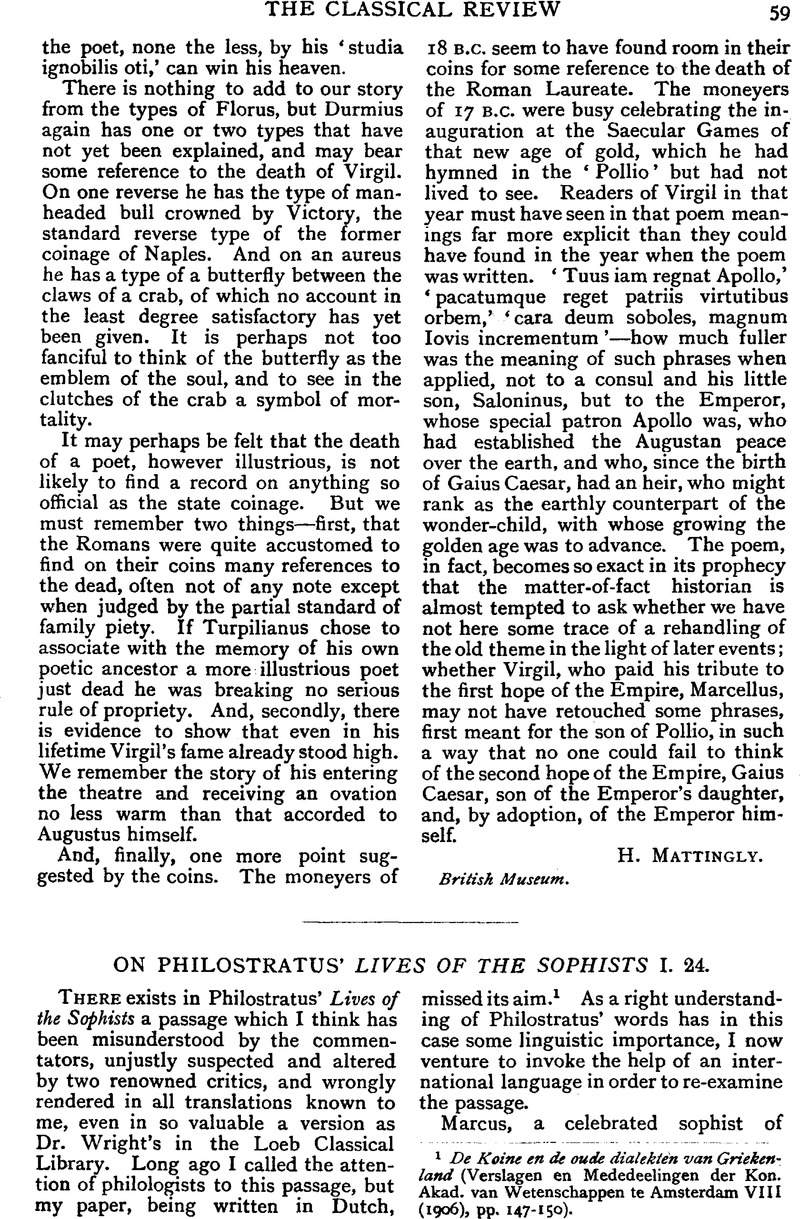Article contents
On Philostratus' Lives of the Sophists I. 24
Published online by Cambridge University Press: 27 October 2009
Abstract

Information
- Type
- Review Article
- Information
- Copyright
- Copyright © The Classical Association 1930
References
page 59 note 1 De Koine en de oude dialekten van Griekenland (Verslagen en Mededeelingen der Kon. Akad. van Wetenschappen te Amsterdam VIII (1906), pp. 147–150)Google Scholar.
page 60 note 1 Philostratus, ed. Kayser, , Vitae Soph. I. 24.Google Scholar
page 60 note 2 Westermann in the Didot edition of Philostratorum et Callisti Opera (Paris, 1849) revised the older Latin version (Preface, p. ii)Google Scholar.
page 60 note 3 Wright, W. C., Philostratus and Eunapius, The Lives of the Sophists, London and New York, 1922, p. 105.Google Scholar
page 60 note 4 Schmid, W., Der Atticismus, etc., IV, 1896, p. 400.Google Scholar
page 60 note 5 Thumb, A., Die griechische Spracheim Zeitalter des Hellenistnus, Strassburg, 1901, p. 32.Google Scholar
page 60 note 6 Marcus was a contemporary of Hadrian; Philostratus lived from about 170 till 244 A.D. (Wright, op. cit. pp. ix–xi).
page 60 note 7 They are discusssd by Sophocles, , Greek Lexicon of the Roman and Byzantine Periods, New York and Leipzig, 1888, p. 3Google Scholar, by Thumb, op. cit., pp. 29–37, and in my paper mentioned above, pp. 145–152.
page 60 note 8 Mnemosyne, 1873, p. 529. In the eighteenth century Wesseling made a similar conjecture, προβαλ⋯ μ⋯ν μελτ⋯σogr;;μαι Wright, receiving Cobet's reading into the text, translates accordingly.
page 60 note 9 So, for instance, Xenophon, Anabasis III, I, 26:![]() a man who spoke with a Boeotian accent or pronunciation. Apollonides was not a true Boeotian (Anabasis III, I, 31). Sturz in his Lexicon Xenophonteum is hardly right in translating ‘ rustico vocis sono utens, pleno gutture loquens.’
a man who spoke with a Boeotian accent or pronunciation. Apollonides was not a true Boeotian (Anabasis III, I, 31). Sturz in his Lexicon Xenophonteum is hardly right in translating ‘ rustico vocis sono utens, pleno gutture loquens.’
page 60 note 10 Of course Cobet, my venerated teacher at Leyden University, knew all this as well as any one else, but probably he thought Philostratus capable of any solecism. This one, however, does not occur in his works ; I am not able to cite from late authors another instance of the supposed use than Anacreontea 11, 6 (ed. V. Rose): ![]() , where, as Mehlhorn remarks, the foursyllable word serves to save the metre.
, where, as Mehlhorn remarks, the foursyllable word serves to save the metre.
- 1
- Cited by

